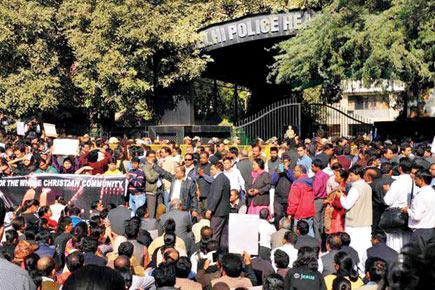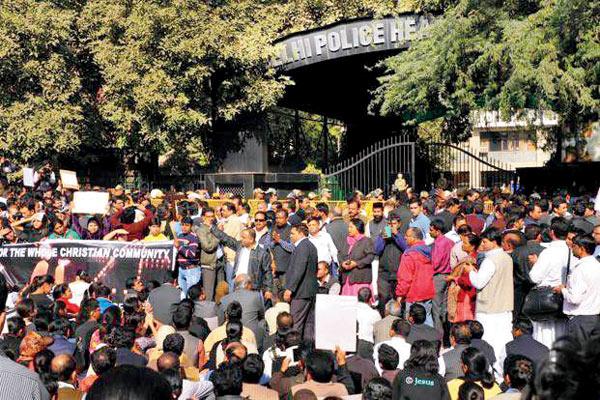Astonishing ignorance laces the arguments proffered by the Left-liberal commentariat and ‘secular’ politicians in defence of religious conversions through deceit, allurement and coercion. A lot of this has been heard in recent days both inside and outside Parliament

Columnists, Kanchan Gupta, Delhi Police Headquarters, St Sebastianu00c3u00a2u00c2u0080u00c2u0099s Church fire, Delhi Archbishop Anil Couto, religion, forced conversion, secularism
 Astonishing ignorance laces the arguments proffered by the Left-liberal commentariat and ‘secular’ politicians in defence of religious conversions through deceit, allurement and coercion. A lot of this has been heard in recent days both inside and outside Parliament.
Astonishing ignorance laces the arguments proffered by the Left-liberal commentariat and ‘secular’ politicians in defence of religious conversions through deceit, allurement and coercion. A lot of this has been heard in recent days both inside and outside Parliament.
Amid the raucous din in Parliament and television studios, a point that is heard over and over again is how converting Hindus to another faith is integral to ‘secularism’, sanctioned by the Constitution, and must never be objected to as that would hurt India’s pluralism. The Idea of India, it would seem, is hinged on the idea of allowing foreign-funded evangelists a free run.
ADVERTISEMENT
“The Constitution guarantees Christian missionaries the right to convert people to Christianity,” we are told. “In a secular country, the Constitution reigns supreme,” we are reminded. “Violation of rights enshrined in the Constitution will destroy democracy,” we are warned.
But what does the Constitution say? Ask the Constitution-thumping saviours of secularism, pluralism and democracy this simple question and they will be stumped. The ‘Constitution of the Socialist, Secular Republic of India’ is likely the most mentioned and least read book in the world. Everybody loves to flaunt it; very few have actually bothered to read it.
This is what Article 25(1) of the Constitution says: “Subject to public order, morality and health and to other provisions of this part, all persons are equally entitled to freedom of conscience and the right to freely profess, practice and propagate religion.” Read it out to those who pretend great outrage every time there’s a hint of protest against conversions, and they will pounce upon you: “See, the Constitution gives Christian missionaries the right to propagate their religion.”

Thousands gathered outside the Delhi Police Headquarters a day after St Sebastian’s Church was gutted in a fire on December 1. Delhi Archbishop Anil Couto said the incident was an “attempt to polarise the people in Delhi state”. Pic/PTI
Wrong. The right to ‘propagate’ does not mean the right to ‘convert’. And it is this inability to distinguish between the two that highlights the appalling ignorance of those who see nothing wrong with offensive evangelism.
That the constitutional right to ‘propagate’ does not mean the right to ‘convert’ was clarified by the Supreme Court while upholding the validity of anti-conversion laws (the Freedom of Religion Act 1967 and the Dharma Swatantraya Adhiniyam 1968) in Odisha and Madhya Pradesh. Chief Justice AN Ray, in his ruling, left little scope for confusion between propagation and conversion. The two, he said, were different.
“What Article 25(1) grants is not the right to convert another person to one’s own religion by exposition of its tenets,” Chief Justice Ray ruled. The Supreme Court, in that judgment, also ruled that States, bearing in mind their responsibility to maintain public order, have the right to adopt laws “prohibiting conversion from one religion to another in a manner reprehensible to the conscience of the community”.
Some years ago, Christian organisations, including the Catholic church, raised a huge hue and cry over violence against evangelists in Rajasthan. Then, as now, the BJP was in power and Vasundhara Raje was the Chief Minister. That was enough of a reason, it would seem, for the onslaught that came from the church and the Minorities Commission.
The furore was centred over a Hindi book, Haqeeqat, which was being freely distributed in Rajasthan’s tribal-dominated areas by ‘Archbishop’ MA Thomas and his son, ‘Reverend’ Samuel Thomas, of the Emmanuel Mission International. Here are some examples — the more lurid and explicit bits do not merit reproduction —of what the book had to say about Hindus and Hinduism: “Hindu gods and goddesses are fictitious and were invented to persecute Dalits.”
“With the progression of time, people all over the world were freed of their ignorance and they began to disown wicked and cruel gods and goddesses. But in India, because people are (enveloped) in the darkness of ignorance, imaginary gods and goddesses are still worshipped.”
“Sita was abandoned in the forest as per Ram’s wishes... Ram later asked Lakshman to kill Sita. In the end, Ram, frustrated with life, drowned himself in Saryu. Such are the teachings of half-naked rishis.”
The Government of Rajasthan, following street protests, decided to ban it to prevent the eruption of violence. Cases were registered against the father-son duo of ‘Archbishop’ Thomas and ‘Reverend’ Thomas. Immediately thereafter, the campaign of calumny began.
It’s not for nothing that Mrs Indira Gandhi, incandescent with rage after the mass conversion of Hindus to Islam at Meenakshipuram in February 1981, favoured the idea of States adopting anti-conversion laws and had the Home Ministry prepare a draft Act for circulation among State Governments.
Why the draft never became law is another story best kept for another day.
 Subscribe today by clicking the link and stay updated with the latest news!" Click here!
Subscribe today by clicking the link and stay updated with the latest news!" Click here!







